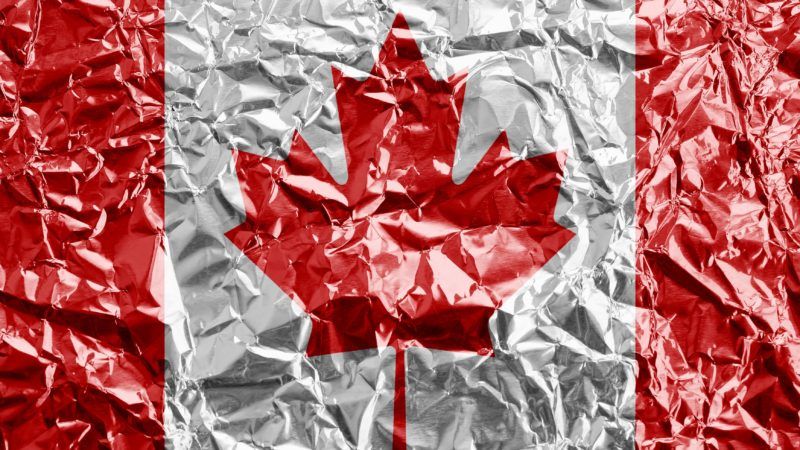U.S. Withdraws Foolish Threat of New Tariffs on Canadian Aluminum
First the Trump administration told us aluminum imported from Canada was a national security threat. Then it suddenly decided it's not a big deal.

One of the more bizarre episodes of President Donald Trump's trade war—and there are plenty of contenders—came to an abrupt end on Tuesday afternoon when the United States backed down from a threat to impose new tariffs on aluminum imports from Canada.
"This was a day where common sense prevailed," Chrystia Freeland, Canada's deputy prime minister, said at a press conference on Tuesday where she announced that Canada would also drop its plans to retaliate against the threatened tariffs.
Indeed, much of American trade policy over the past few years has been marked by a shortage of common sense. But slapping new tariffs on aluminum imported from Canada—and doing so just weeks after the United States and Canada (and Mexico) signed a new trade agreement—was always completely indefensible.
Officially, the new tariffs were a response to what the White House called, at the urging of lobbyists for two domestic aluminum manufacturers, a surge in aluminum imports from Canada. That claim was a bunch of nonsense, but even if it were true, it wouldn't be something to be upset about. The United States does not produce enough aluminum to meet domestic needs, so imports are essential for supporting the 97 percent of American aluminum industry jobs that are in downstream production. No wonder there was widespread opposition to the tariffs from the American aluminum industry—you know, the very industry that these tariffs were supposed to be protecting.
Unofficially, the entire episode is a good demonstration of how unmoored from reality the Trump administration's views on trade have become. Like it did in 2018, the White House was planning to use Section 232 of the Trade Expansion Act of 1962 to impose tariffs on Canadian aluminum in the name of national security.
In fact, Trump's August 6 proclamation announcing the renewed (and now canceled) tariffs is a good illustration of the absurdity of that whole line of argument. The document goes through the administration's two years of waffling between declaring "that aluminum articles were being imported into the United States in such quantities and under such circumstances as to threaten to impair the national security of the United States," and subsequently deciding that "imports of aluminum from Canada would no longer threaten to impair the national security," before reversing course again just months later and then once more on Tuesday.
Strip away the fancy letterhead and self-serious rhetoric, and you're left with a rather silly proposition. As Sen. Chuck Grassley (R–Iowa) wrote on Twitter shortly after the administration announced the new tariff plans: "Use of national defense tariffs is ridiculous, beer cans are not defense weapons."
But perhaps nothing reveals the ridiculousness of the Trump administration's claim that aluminum imports are a national security issue like what the Trump administration did on Tuesday. If this were a matter of national security, suddenly changing the decision to levy tariffs would be imprudent.
The entire charade of treating routine, peaceful transactions between people on different sides of a border as somehow undermining national security has always been farcical—at least if you live in a world where the words "national security" have meaning. It would be funnier, of course, if there weren't thousands of jobs hanging in the balance, subject to the whims of a president and his trade advisers who seem to have learned little from two-plus years of trade wars that stubbornly refuse to be either good or easy to win.
Still, give the White House some credit for recognizing this folly before it went any further.
"Removing these disruptive and unnecessary tariffs on Canadian aluminum was the right decision for the U.S. aluminum industry and its 162,000 workers," Tom Dobbins, president and CEO of the Aluminum Association, an industry group, said in a statement. "Especially as the industry continues to recover from the worst of the COVID-driven demand disruptions, it is vital that we keep North American aluminum supply chains open and unencumbered."


Show Comments (26)